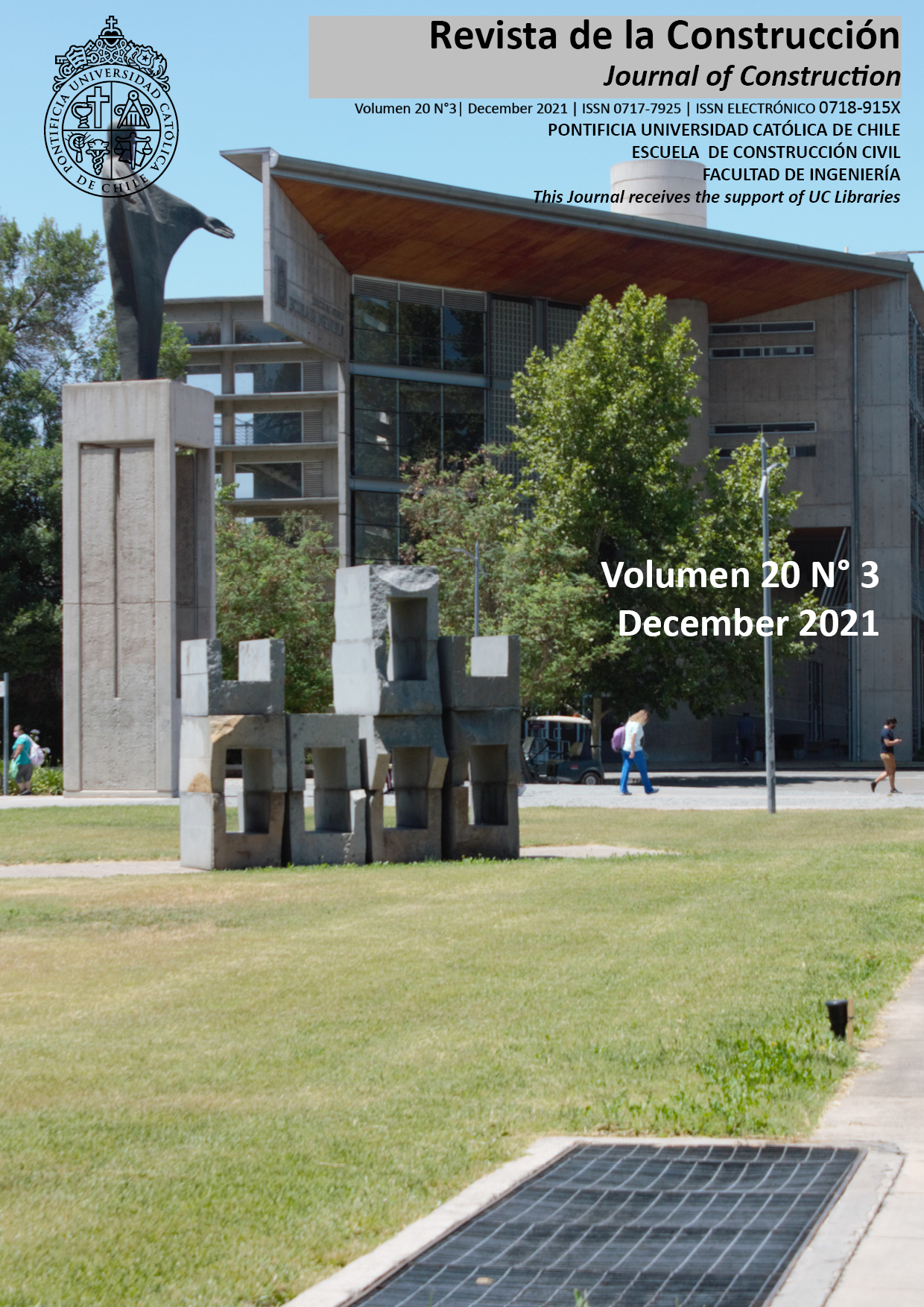Identification of risk factors involved in SCP of developing coun-tries-establishing guidelines: an analysis of mixed method se-quential approach
DOI:
https://doi.org/10.7764/RDLC.20.3.407Keywords:
project performance, risk assessment, SCP, construction developmentAbstract
Risk evaluation and its identification is one of the prominent fields in the construction industry concerning performance management and project success. Under the project mechanism and business development system, risk assessment and mitigation are compulsory components of a management network to achieve the project's success. In this study, the major focus of risk assessment and management revolves around the SCP (small construction projects) which are the backbone of the construction industry. Every stakeholder is involved in this process because the construction of the house is a basic need of humans for a living. Targeting the major stakeholders (contractors, consultants, and clients) as mixed-method (qualitative & quantitative) sequential approach has been adopted to evaluate the major risk factors and their occurrence with the assessment of risk management system at the country level in SCP (small construction projects). The data used in this research has been collected from sixty-two (62) small construction firms, thirty-two (32 projects), to attain the research objectives. The results indicate that the performances of most of the risk management system and organizations are responsive, shapeless, semi-stable, and unorganized with inexistent and confined compromised resources to respond with risks. The major issue was identified as the non-existence of a proper risk management system because no formal education is involved with the personals working in small construction projects. The five most important risks that should be preferable are quality and quantity dissimilarity, change in scope of work/design, deficiency of manpower, planning, and management, and technical errors. The prime hurdles which are analyzed for impressive risk management are the absence of connection between construction experts and contractors who have not been formally trained at any technical institute. This study will help in targeting the existing gap for implementation of the risk management system at small construction engineering projects. Furthermore, it will generate a pathway for the young enterprisers to come forward and take part in the development of the small construction industry by implementing effective risk management practices to achieve the project performance in terms of project success and fruitful outcomes for the upcoming projects.
References
Abd El-Karim, M.S.B.A., Mosa El Nawawy, O.A., Abdel-Alim, A.M., 2017. Identification and assessment of risk factors affecting construction projects. HBRC J. 13, 202–216.
Ali, L., Nawaz, A., Iqbal, S., Basheer, M.A., Hameed, J., Albasher, G., Adnan, S., Shah, R., Bai, Y., 2021. Dynamics of Transit Oriented Development, Role of Greenhouse Gases and Urban Environment: A Study for Management and Policy.
Avotra, A.A.R.N., Chenyun, Y., Yongmin, W., Lijuan, Z., Nawaz, A., 2021. Conceptualizing the State of the Art of Corporate Social Responsibility (CSR) in Green Construction and Its Nexus to Sustainable Development. Front. Environ. Sci. 9, 541. https://doi.org/10.3389/fenvs.2021.774822
Barber, R.B., 2005. Understanding internally generated risks in projects. Int. J. Proj. Manag. 23, 584–590.
Bing, L., Akintoye, A., Edwards, P.J., Hardcastle, C., 2005. The allocation of risk in PPP/PFI construction projects in the UK. Int. J. Proj. Manag. 23, 25–35.
Carpio-de Los Pinos, A.J., González-García, M. de L.N., 2020. Development of the protocol of the occupational risk assessment method for construction works: Level of Preventive Action. Int. J. Environ. Res. Public Health 17, 6369.
El-Sayegh, S.M., 2008. Risk assessment and allocation in the UAE construction industry. Int. J. Proj. Manag. 26, 431–438.
Fung, I.W.H., Tam, V.W.Y., Chu, J.O.C., Le, K.N., 2020. A Stress-Strain Model for resilience engineering for construction safety and risk management. Int. J. Constr. Manag. 1–17.
Griffith, A., Headley, J.D., 1998. Management of small building works. Constr. Manag. Econ. 16, 703–709.
Hamzaoui, F., Amine Allal, M., Taillandier, F., Achoui, M., 2019. Risk management in construction projects by coupling the SMACC agent with the MADS MOSAR method–application to the dam project in Mascara, Algeria. Int. J. Constr. Manag. 1–15.
Hao, W., Mehmood, S., Shah, A., Nawaz, A., Atif, M., Noman, S.M., 2020. The Impact of CPEC on Infrastructure Development, A-Double Mediating Role of Project Success Factors & Project Management. Rev. Argentina Clínica Psicológica XXIX, 737–750. https://doi.org/10.24205/03276716.2020.878
Huo, C., Hameed, J., Nawaz, A., Adnan Raheel Shah, S., albahser, G., Alqahtani, W., Maqsoom, A., Kashif Anwar, M., 2021. Scientific risk performance analysis and development of disaster management framework: A case study of developing Asian countries. J. King Saud Univ. - Sci. 33. https://doi.org/10.1016/j.jksus.2021.101348
Hwang, B.-G., Zhao, X., Toh, L.P., 2014. Risk management in small construction projects in Singapore: Status, barriers and impact. Int. J. Proj. Manag. 32, 116–124.
Iqbal, S., Choudhry, R.M., Holschemacher, K., Ali, A., Tamošaitienė, J., 2015. Risk management in construction projects. Technol. Econ. Dev. Econ. 21, 65–78.
Jaafari, A., 2001. Management of risks, uncertainties and opportunities on projects: time for a fundamental shift. Int. J. Proj. Manag. 19, 89–101.
Kangari, R., 1995. Risk management perceptions and trends of US construction. J. Constr. Eng. Manag. 121, 422–429.
Kerkhove, L.-P., Vanhoucke, M., 2017. Extensions of earned value management: Using the earned incentive metric to improve signal quality. Int. J. Proj. Manag. 35, 148–168.
Khan, M.W., Ali, Y., De Felice, F., Petrillo, A., 2019. Occupational health and safety in construction industry in Pakistan using modified-SIRA method. Saf. Sci. 118, 109–118. https://doi.org/10.1016/j.ssci.2019.05.001
Kwofie, T.E., Alhassan, A., Botchway, E., Afranie, I., 2015. Factors contributing towards the effectiveness of construction project teams. Int. J. Constr. Manag. 15, 170–178.
Liu, J., Low, S.P., Zhang, Q., 2018. Enterprise risk management practices of top ENR international contractors. Int. J. Constr. Manag. 18, 364–374.
Low, S.P., Liu, J.Y., He, S.Q., 2008. Management of external risks: case study of a Chinese construction firm at infancy stage in Singapore. Int. J. Constr. Manag. 8, 1–15.
Lyons, T., Skitmore, M., 2004. Project risk management in the Queensland engineering construction industry: a survey. Int. J. Proj. Manag. 22, 51–61.
Maqsoom, A., Babar, Z., Shaheen, I., Abid, M., Kakar, M.R., Mandokhail, S.J., Nawaz, A., 2021. Influence of Construction Risks on Cost Escalation of Highway-Related Projects: Exploring the Moderating Role of Social Sustainability Requirements. Iran. J. Sci. Technol. - Trans. Civ. Eng. https://doi.org/10.1007/s40996-021-00601-2
Medda, F., 2007. A game theory approach for the allocation of risks in transport public private partnerships. Int. J. Proj. Manag. 25, 213–218.
Mishra, S., Mishra, B., 2016. A study on risk factors involved in the construction projects. Int. J. Innov. Res. Sci. Eng. Technol. 5, 1190–1196.
Mohamed, O., Abd-Karim, S.B., Roslan, N.H., Mohd Danuri, M.S., Zakaria, N., 2015. Risk management: Looming the modus operandi among construc-tion contractors in Malaysia. Int. J. Constr. Manag. 15, 82–93.
Nasir, D., McCabe, B., Hartono, L., 2003. Evaluating risk in construction–schedule model (ERIC–S): construction schedule risk model. J. Constr. Eng. Manag. 129, 518–527.
Nasirzadeh, F., Mazandaranizadeh, H., Rouhparvar, M., 2016. Quantitative risk allocation in construction projects using cooperative-bargaining game theo-ry. Int. J. Civ. Eng. 14, 161–170.
Nawaz, A., Khan, R.M., Ayaz, M., Zahoor, H., Maqsoom, A., 2021a. Project control and forecast assessment of building projects in Pakistan using earned value management. Eng. Constr. Archit. Manag. ahead-of-p. https://doi.org/10.1108/ECAM-11-2020-0989
Nawaz, A., Su, X., Din, Q.M.U., Khalid, M.I., Bilal, M., Shah, S.A.R., 2020. Identification of the h&s (Health and safety factors) involved in infra-structure projects in developing countries-a sequential mixed method approach of OLMT-project. Int. J. Environ. Res. Public Health 17. https://doi.org/10.3390/ijerph17020635
Nawaz, A., Su, X., Nasir, I.M., 2021b. BIM Adoption and Its Impact on Planning and Scheduling Influencing Mega Plan Projects-(CPEC-) Quantitative Approach.
Nawaz, A., Waqar, A., Shah, S.A.R., Sajid, M., Khalid, M.I., 2019. An innovative framework for risk management in construction projects in developing countries: Evidence from Pakistan. Risks 7. https://doi.org/10.3390/risks7010024
PMI, A., 2017. Guide to the Project Management Body of Knowledge (PMBoK Guide), Newtown Square, PA, USA: Project Management Institute.
Qin, Z., Ji, C., Su, X., Nawaz, A., 2021. Probability Analysis of Construction Risk based on Noisy-or Gate Bayesian Networks. Reliab. Eng. Syst. Saf. 107974.
Rasul, N., Malik, M.S.A., Bakhtawar, B., Thaheem, M.J., 2019. Risk assessment of fast-track projects: a systems-based approach. Int. J. Constr. Manag. 1–16.
Reader, T.W., Noort, M.C., Shorrock, S., Kirwan, B., 2015. Safety sans Frontieres: an international safety culture model. Risk Anal. 35, 770–789.
Sharma, M.K., 2020. Monte Carlo Simulation Applications for Construction Project Management. Int. J. Civ. Eng. Technol. 11.
Sharma, V.K., Sharma, S.K., Singh, A.P., 2019. Risk enablers modelling for infrastructure projects using Bayesian belief network. Int. J. Constr. Manag. 1–18.
Shayan, S., Pyung Kim, K., Tam, V.W.Y., 2019. Critical success factor analysis for effective risk management at the execution stage of a construction project. Int. J. Constr. Manag. 1–8.
Smith, N.J., Merna, T., Jobling, P., 2014. Managing risk in construction projects. John Wiley & Sons.
Soliño, A.S., 2014. Analysis of the optimal sharing of construction risk in public procurement contracts. Rev. la Construcción. J. Constr. 13, 74–80.
Tang, W., Qiang, M., Duffield, C.F., Young, D.M., Lu, Y., 2007. Risk management in the Chinese construction industry. J. Constr. Eng. Manag. 133, 944–956.
Tavakolan, M., Mohammadi, A., 2018. Risk management workshop application: a case study of Ahwaz Urban Railway project. Int. J. Constr. Manag. 18, 260–274.
Tepeli, E., Taillandier, F., Breysse, D., 2019. Multidimensional modelling of complex and strategic construction projects for a more effective risk manage-ment. Int. J. Constr. Manag. 1–22.
Trajkovski, S., Loosemore, M., 2006. Safety implications of Low-English proficiency among migrant construction site operatives. Int. J. Proj. Manag. 24, 446–452.
Uher, T.E., Toakley, A.R., 1999. Risk management in the conceptual phase of a project. Int. J. Proj. Manag. 17, 161–169.
Wahyudi, P.U., 2021. Occupational safety and health performance in the Pakistani construction industry: stakeholders’ perspective. Occup. Saf. Heal. Perform. Pakistani Constr. Ind. stakeholders’ Perspect.
Walker, A., Ameyaw, E.E., Chan, A.P.C., 2015. Evaluating key risk factors for PPP water projects in Ghana: a Delphi study. J. Facil. Manag.
Wang, Y., Han, Q., De Vries, B., Zuo, J., 2016. How the public reacts to social impacts in construction projects? A structural equation modeling study. Int. J. Proj. Manag. 34, 1433–1448.
Westney, R.E., 1985. Managing the Engineering and Construction of Small Projects, Marcell Deckker.
Xiang, P., Jia, F., Li, X., 2018. Critical behavioral risk factors among principal participants in the Chinese construction industry. Sustainability 10, 3158.
Xiaolong, T., Gull, N., Iqbal, S., Asghar, M., Nawaz, A., Albasher, G., Hameed, J., Maqsoom, A., 2021. Exploring and Validating the Effects of Mega Projects on Infrastructure Development Influencing Sustainable Environment and Project Management. Front. Psychol. 12, 1251.
Yingfei, Y., Mengze, Z., Zeyu, L., Ki-Hyung, B., Avotra, A.A.R.N., Nawaz, A., 2021. Green Logistics Performance and Infrastructure on Service Trade and Environment-Measuring Firm’s Performance and Service Quality. J. King Saud Univ. 101683.
Zhang, F., 2021. Technological knowledge access and transfer of multinational corporations from emerging economies: a comparison study. Chinese Manag. Stud. ahead-of-p. https://doi.org/10.1108/CMS-12-2019-0437
Zilke, J.P., Taylor, J.E., 2015. Evaluating the suitability of using international market analyses to characterize the global construction industry. J. Manag. Eng. 31, 4014078.
Zou, P.X.W., Zhang, G., Wang, J., 2007. Understanding the key risks in construction projects in China. Int. J. Proj. Manag. 25, 601–614.





